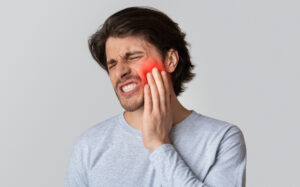Dental emergencies can strike unexpectedly, often leaving you in pain and anxious about your oral health. Being prepared can make all the difference in managing these situations effectively and minimising potential damage. We believe that preparation is key to ensuring your smile stays healthy and beautiful, even during unforeseen circumstances. This comprehensive guide will help you stay prepared for dental emergencies, ensuring you know what steps to take when the unexpected happens.
Understanding Common Dental Emergencies
Before diving into preparation, it’s essential to recognise what constitutes a dental emergency. Common dental emergencies include:
- Toothache: Persistent or severe pain may indicate an underlying issue like an infection or tooth decay.
- Chipped or Broken Teeth: Damage to the tooth structure can lead to sensitivity, pain, and further complications if not treated promptly.
- Knocked-Out Teeth: Time is critical in reimplanting a knocked-out tooth to increase the chances of saving it.
- Lost Fillings or Crowns: Missing dental work can expose teeth to bacteria, leading to decay and sensitivity.
- Soft Tissue Injuries: Cuts or lacerations to the gums, cheeks, or tongue may require immediate attention to prevent infection and promote healing.
- Abscesses: Infections in the tooth or gums can cause swelling, pain, and systemic symptoms like fever.
Creating a Dental Emergency Kit
Having a dental emergency kit at home can provide immediate relief and prevent further damage while you seek professional care. Your kit should include:
- Dental First Aid Supplies:
- Gauze pads for controlling bleeding.
- Temporary dental cement to cover exposed roots or hold broken pieces in place.
- A small container with a lid for storing knocked-out teeth if applicable.
- Tweezers and scissors for minor adjustments or removing debris.
- Pain Relief Medications:
- Over-the-counter pain relievers like ibuprofen or acetaminophen to manage pain and reduce inflammation.
- Cold Packs:
- To apply externally and reduce swelling in the event of a soft tissue injury or trauma.
- Antiseptic Mouthwash:
- To clean the affected area and prevent infection.
Knowing Who to Call in Case of an Emergency
Establishing a relationship with a trusted dentist who offers emergency services is crucial. At Najmi Dental we provide prompt and effective care for all dental emergencies. Ensure you have our contact information readily available, including:
- Clinic Address and Phone Number: Keep it in your phone and written somewhere accessible.
- Emergency Contact Procedures: Understand our process for handling after-hours emergencies, whether through a dedicated hotline or an on-call dentist.
- Nearest Emergency Room: In severe cases where immediate medical attention is required, know the location of the closest emergency room.
Steps to Take Immediately During an Emergency
When faced with a dental emergency, quick and calm action can significantly impact the outcome. Follow these steps to manage the situation effectively:
- Assess the Situation:
- Determine the severity of the emergency and decide whether it requires immediate professional attention.
- Control Bleeding:
- Use a clean gauze pad to apply gentle pressure to the affected area for about 10-15 minutes until the bleeding stops.
- Manage Pain and Swelling:
- Take over-the-counter pain relievers and apply a cold pack to reduce swelling and alleviate discomfort.
- Preserve Knocked-Out Teeth:
- If a tooth is knocked out, handle it by the crown (not the root), rinse it gently with water if dirty, and place it back in the socket if possible. If not, store it in milk or a saline solution and seek immediate dental care.
- Protect Exposed Roots:
- Cover exposed roots with a piece of sugar-free gum or wax to protect them until you can reach the dentist.
- Remove Debris:
- For chipped or broken teeth, gently remove any loose pieces and rinse your mouth with water.
- Seek Professional Help:
- Contact your dentist as soon as possible to schedule an emergency appointment and receive appropriate treatment.
Prevention Tips to Minimise Dental Emergencies
While not all dental emergencies can be prevented, adopting certain habits can significantly reduce the risk:
- Maintain Good Oral Hygiene:
- Brush and floss regularly to prevent tooth decay and gum disease, which are common causes of emergencies.
- Wear a Mouthguard:
- If you participate in contact sports or grind your teeth at night, wearing a mouthguard can protect your teeth from trauma.
- Avoid Hard Foods:
- Limit consumption of hard foods like ice, hard candies, and nuts that can cause tooth fractures.
- Regular Dental Check-ups:
- Routine visits allow your dentist to identify and address potential issues before they escalate into emergencies.
Information to Have on Hand
In the event of a dental emergency, having essential information readily available can expedite treatment:
- Medical and Dental History:
- Details about any allergies, medications, or existing dental conditions.
- Contact Information:
- Emergency contacts, including family members and your dentist’s information.
- Insurance Information:
- Details about your dental insurance coverage to facilitate billing and reimbursements.
Conclusion
Being prepared for dental emergencies ensures that you can respond effectively when the unexpected happens. By understanding common emergencies, creating a dental emergency kit, knowing who to call, and adopting preventive measures, you can protect your oral health and maintain a confident smile. A Najmi Dental, we are here to support you through any dental emergency with prompt, professional care. Don’t hesitate to reach out to us for any urgent dental needs. Your oral health is our priority.


